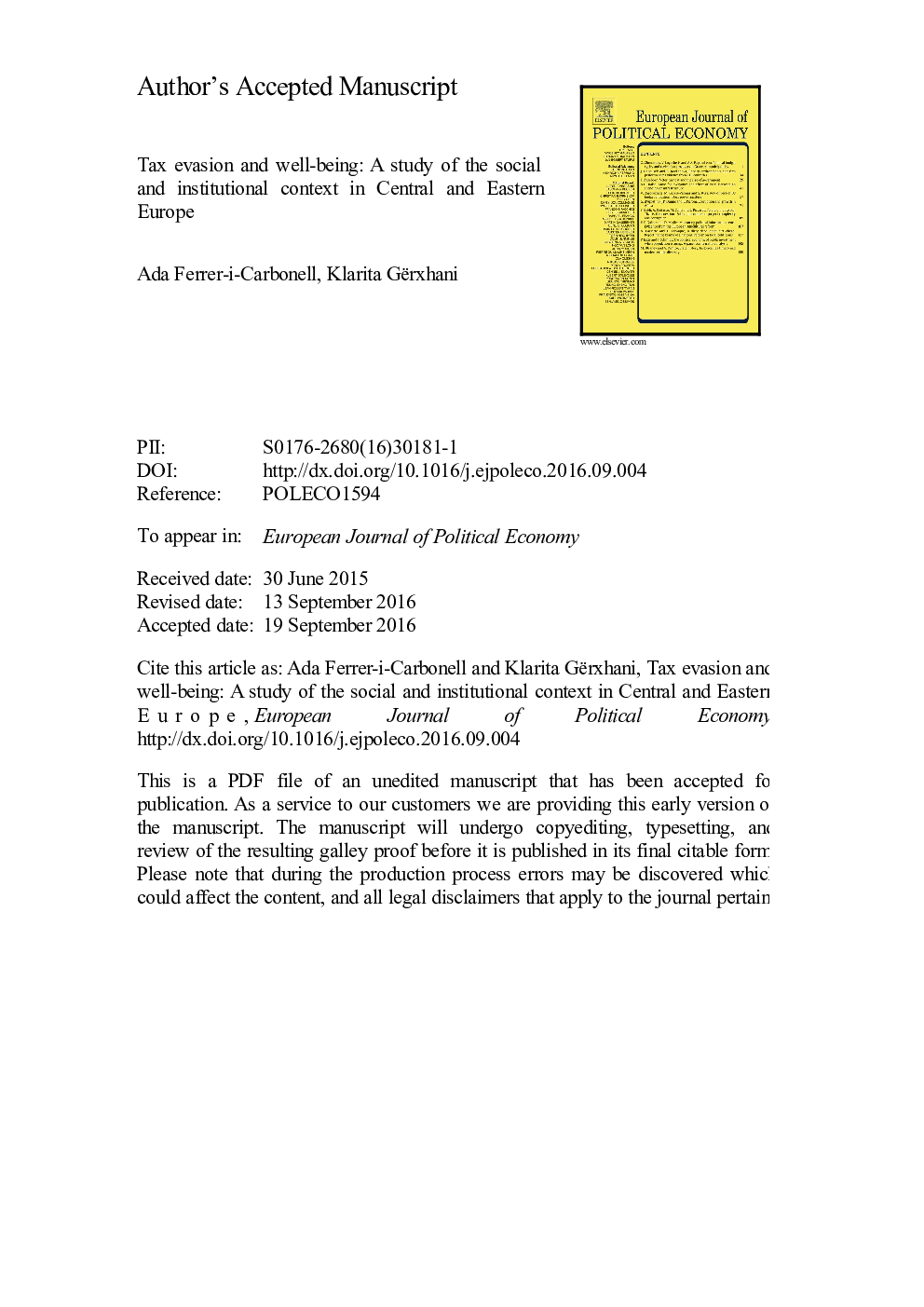| کد مقاله | کد نشریه | سال انتشار | مقاله انگلیسی | نسخه تمام متن |
|---|---|---|---|---|
| 5067818 | 1476880 | 2016 | 29 صفحه PDF | دانلود رایگان |
عنوان انگلیسی مقاله ISI
Tax evasion and well-being: A study of the social and institutional context in Central and Eastern Europe
ترجمه فارسی عنوان
فرار از پرداخت مالیات و رفاه: بررسی وضعیت اجتماعی و نهادی در اروپای مرکزی و شرقی
دانلود مقاله + سفارش ترجمه
دانلود مقاله ISI انگلیسی
رایگان برای ایرانیان
کلمات کلیدی
ترجمه چکیده
این مقاله رابطه بین فرار مالیاتی و رفاه افراد را با استفاده از یک سوال ذهنی در مورد رضایت از زندگی در چهارده کشور اروپای مرکزی و شرقی بررسی می کند. این مقاله بر نقش نهاد ها و سرمایه اجتماعی در شکل گیری این رابطه تمرکز دارد. نتایج نشان می دهد که جلوگیری از مالیات منفی با رضایت زندگی افراد است. به نظر می رسد این رابطه منفی با درک مثبت از مؤسسات مالی رسمی و سطح بالایی از سرمایه اجتماعی رسمی شکل گرفته است. تجزیه و تحلیل مشابهی برای دو گروه نسل، که از لحاظ داشتن تجربه کار در دوران کمونیسم متمایز است، به دست می آید، نتایج جالبی به دست می دهد: در حالی که تعاملات اجتماعی (یعنی سرمایه رسمی اجتماعی) نقش نسبی جوانان را در روابط آنها تجربه می کنند بین اخراج مالیات و چگونگی رضایت از زندگی آنها، برای نسل های قدیمی این شبکه اجتماعی آنها (یعنی سرمایه اجتماعی غیر رسمی) است که این رابطه را شکل می دهد.
موضوعات مرتبط
علوم انسانی و اجتماعی
اقتصاد، اقتصادسنجی و امور مالی
اقتصاد و اقتصادسنجی
چکیده انگلیسی
The paper examines the relationship between tax evasion and individuals' well-being by using a subjective question on life satisfaction in fourteen Central and Eastern European countries. The paper focuses on the role of institutions and social capital in molding this relationship. The results indicate that evading taxes is negatively associated with individuals' life satisfaction. This negative relationship seems to be shaped by a positive perception of formal tax-related institutions and a high level of formal social capital. A similar analysis run for two generational groups, distinguished in terms of whether having had working experience during communism, yields further interesting results: while associational engagement (i.e. formal social capital) has a crucial role to the younger generation in the way they experience the relationship between evading tax and how satisfied they are with their life, for the older generation it is their social networks (i.e. informal social capital) that shape this relationship.
ناشر
Database: Elsevier - ScienceDirect (ساینس دایرکت)
Journal: European Journal of Political Economy - Volume 45, Supplement, December 2016, Pages 149-159
Journal: European Journal of Political Economy - Volume 45, Supplement, December 2016, Pages 149-159
نویسندگان
Ada Ferrer-i-Carbonell, Klarita Gërxhani,
